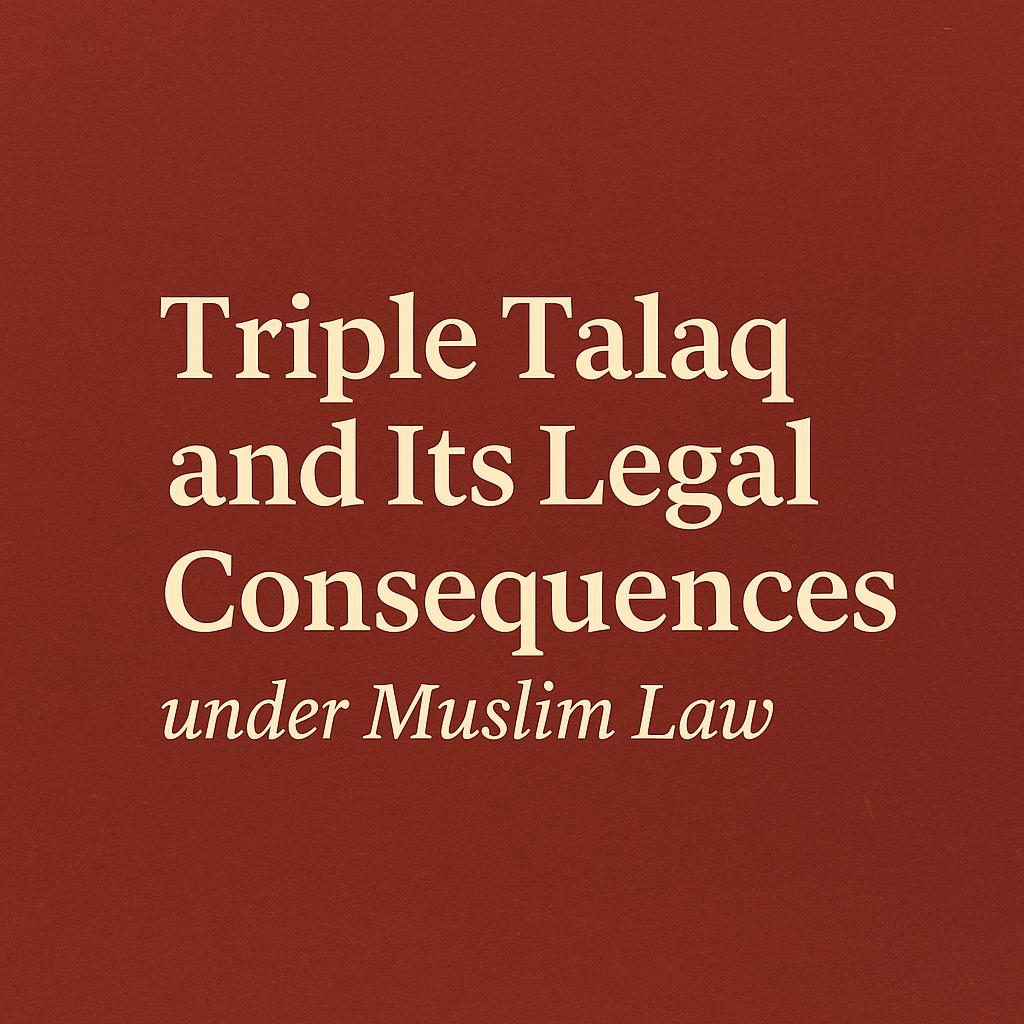 Triple Talaq and Its Legal Consequences Under Muslim Law
Triple Talaq and Its Legal Consequences Under Muslim Law
Key Case: Rashid Ahmad v. Anisa Khatoon (1932)
In this landmark case, Ghayas Uddin pronounced triple talaq (talaq-ul-biddat) in the absence of his wife, Anisa Khatoon, and later executed a divorce deed (talaqnama). Despite the divorce, the couple continued living together and had five children, whom Ghayas Uddin treated as legitimate. However, the court ruled:
• There was no evidence of remarriage, nor any intermediate marriage with consummation (a requirement for remarriage after triple talaq under Sunni law).
• Therefore, the subsequent cohabitation was void, and the children born after the divorce were held to be illegitimate.
• The pronouncement of “I divorce Anisa Khatoon forever and render her haram for me” clearly showed an irrevocable intention.
• The triple talaq was valid, and remarriage was not lawful without fulfilling halala conditions.
Legal Principle Established:
Mere cohabitation after an irrevocable talaq does not restore the marriage, nor legitimize the children, unless the proper Islamic procedure (intervening marriage and divorce) is fulfilled.
Recent Judgment: Saheer v. State of Kerala (2023)
In this case, the Kerala High Court quashed criminal charges against a husband who pronounced talaq-e-hasan, not talaq-e-biddat.
Court Observations:
• Talaq-e-hasan is valid under Muslim Personal Law and involves three pronouncements over three tuhrs (menstrual cycles) without intercourse.
• It is revocable during the waiting period (iddat).
• The Muslim Women (Protection of Rights on Marriage) Act, 2019 penalizes only talaq-e-biddat (instant triple talaq), not talaq-e-ahsan or hasan.
🔺 Key Highlights:
• The husband made efforts for reconciliation.
• Talaq was pronounced after failed mediations and with stated reasons.
• The court found no element of instant or irrevocable talaq.
• Criminal proceedings under Sections 498A IPC and 3/4 of the Muslim Women Act, 2019 were quashed.
Types of Talaq Recognized in Muslim Law
Talaq-e-Ahsan:
• Single pronouncement during a tuhr (period of purity).
• Followed by iddat without intercourse.
• Revocable during iddat by resuming cohabitation.
Talaq-e-Hasan:
• Three pronouncements during three successive tuhrs.
• No intercourse in between.
• If cohabitation resumes after first or second talaq, it is revoked.
❌ Talaq-e-Biddat (Instant Triple Talaq):
• Instant and irrevocable.
• Now illegal and void under the 2019 Act and Shayara Bano v. Union of India (2017) ruling.
• Punishable with up to 3 years imprisonment and fine under Section 4 of the 2019 Act.
Legal Consequences of Divorce in Muslim Law
Regardless of the form of talaq, the following consequences arise:
1️⃣ Right to Remarry:
• Parties can remarry after completion of iddat.
• Wife must undergo halala (intervening marriage with another man, consummation, and divorce) if divorced by triple talaq.
• Without fulfilling halala, remarriage is not valid, and children of such union are illegitimate.
2️⃣ Dower (Mahr):
• If marriage was consummated, entire unpaid dower (prompt + deferred) becomes immediately payable.
• If not consummated, half dower is payable (if specified), or three articles of dress (if unspecified).
3️⃣ Inheritance Rights:
• Mutual rights of inheritance cease after the divorce becomes irrevocable.
4️⃣ Cohabitation Becomes Unlawful:
• After irrevocable divorce, any physical relationship is unlawful, and children born from such a union are illegitimate.
• Such children cannot be legitimized even through acknowledgment.
5️⃣ Maintenance:
• The wife is entitled to maintenance during iddat of divorce, but not during iddat of death.
Important Conditions for Remarriage After Triple Talaq:
To remarry after an irrevocable triple talaq, the following steps must be fulfilled:
1. Iddat must be observed by the wife.
2. She must lawfully marry another man.
3. The second marriage must be consummated.
4. The second husband must either divorce her or die.
5. She must observe iddat again after that.
👉 Without these steps, any remarriage with the first husband is invalid, and any children born out of such union are illegitimate.
Conclusion
Muslim Law allows multiple forms of divorce, but not all are recognized as legal under modern Indian legislation.
• Talaq-e-biddat has been declared unconstitutional and illegal, while talaq-e-ahsan and talaq-e-hasan remain valid.
• Case law like Rashid Ahmad v. Anisa Khatoon emphasizes the importance of proper procedure and remarriage conditions.
• Recent rulings, like in Saheer v. State of Kerala (2023), further clarify the legal position and safeguard against misuse of Muslim divorce laws.
Start Your Preparation with TOA
At Theory of Abrogation, we equip you with everything you need:
•Subject-wise expert classes
•Mock test series
•Legal current affairs
•Personalized mentorship for interview preparation
✓ “Your law degree is your foundation, but your preparation is what will build your success.”
Join Our New Batch Now!
Prepare smart. Prepare with Theory of Abrogation.
Contact Us:
📍 B-109, Commercial
Complex Dr. Mukherjee
Nagar, Delhi-09
📞 +91 9971399324 | +91 8840961324
📧[email protected]
